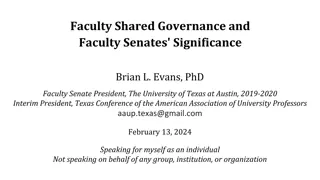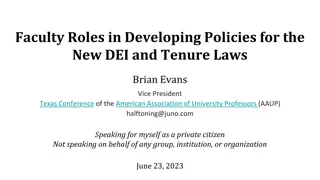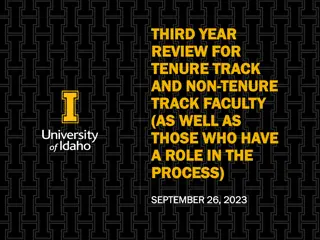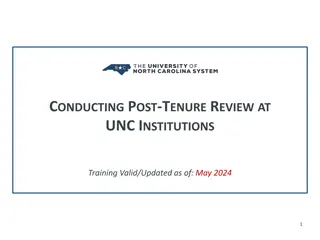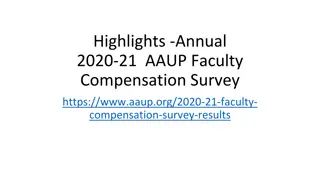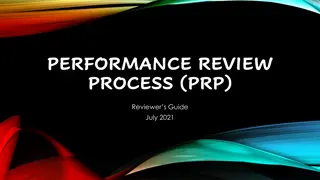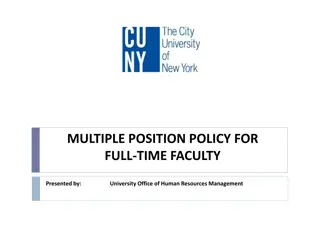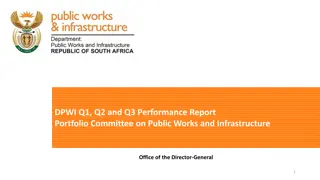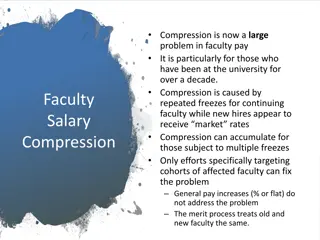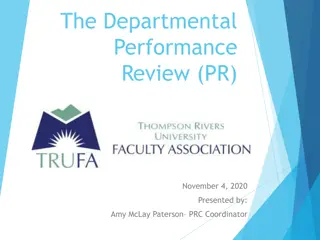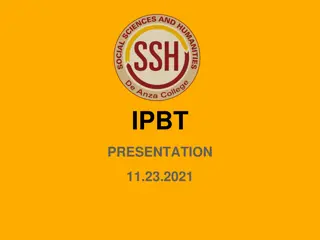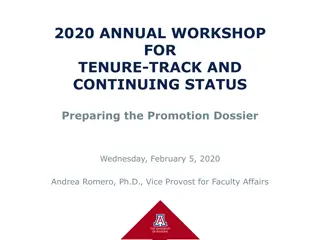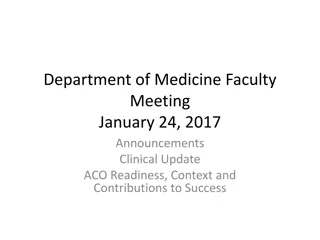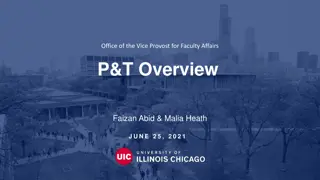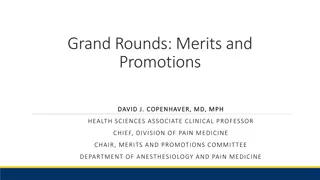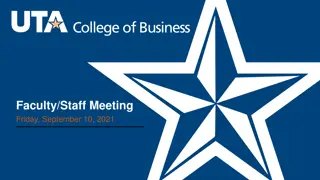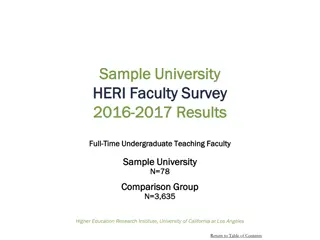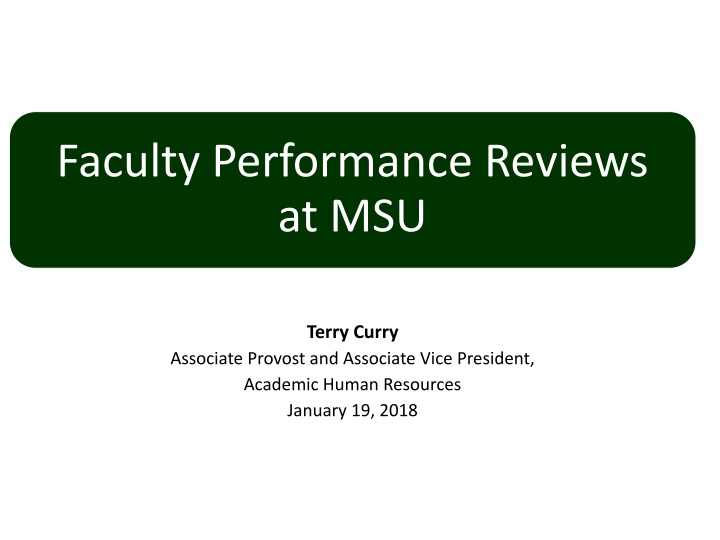
MSU Faculty Performance Evaluation Policies and Guidelines
"Learn about Michigan State University's robust policies for evaluating faculty members, including the tenure system, fixed-term faculty, and specialists. Clear criteria, annual assessments, and transparent processes ensure accountability and support continuous professional development. Discover the key aspects of faculty performance reviews at MSU." (Characters: 318)
Download Presentation

Please find below an Image/Link to download the presentation.
The content on the website is provided AS IS for your information and personal use only. It may not be sold, licensed, or shared on other websites without obtaining consent from the author. If you encounter any issues during the download, it is possible that the publisher has removed the file from their server.
You are allowed to download the files provided on this website for personal or commercial use, subject to the condition that they are used lawfully. All files are the property of their respective owners.
The content on the website is provided AS IS for your information and personal use only. It may not be sold, licensed, or shared on other websites without obtaining consent from the author.
E N D
Presentation Transcript
Faculty Performance Reviews at MSU Terry Curry Associate Provost and Associate Vice President, Academic Human Resources January 19, 2018
THE MSU POLICY: Tenure System Faculty Tenure system faculty evaluated annually Clearly formulated, written performance criteria provided at time of appointment to clarify expectations Faculty shall be informed of factors used, evaluation of their performance on the factors, and the relationship between their performance and decisions on merit adjustments and RPT where appropriate Annual assessments shall be reflected in RPT recommendations 2
MSU POLICY GUIDELINES: Tenure System Faculty Process completed by beginning of fall semester Faculty submit written activity summary Use advice of peer review committees where applicable Written review within 3 months of evaluation Faculty who disagree can meet with chair after receiving review and provide comment within one month. Full documentation placed in personnel file Meetings encouraged before the written review; faculty have right to meeting afterwards. 3
THE MSU POLICY: Fixed Term Faculty Evaluated on an annual basis and informed in writing of the results by the unit administrator. Each unit should clarify expectations by having clearly formulated performance criteria, provided to faculty. Faculty shall be informed of factors, and the relationship between their performance and decisions on merit adjustments and, if appropriate, on reappointment and promotion. All assigned duties should be given weight. Annual assessments shall be reflected in recommendations to the Provost's Office regarding additional appointments, reappointment, and/or promotion. 4
THE MSU POLICY: Specialists The academic specialist shall be evaluated by the appropriate unit administrator before the end of the applicable annual duty period for those on probationary or fixed term appointment and at appropriate intervals for those with continuing appointment status.
Evaluation shall be based on the duties and responsibilities specified in the job description for the specific position, general merit guidelines and the provisions of the Academic Specialist Appointment System. The academic specialist with a probationary appointment shall be evaluated annually to determine progress toward goals and/or the identification of goals. Units may also use the annual evaluation to assist in the assignment of merit and other salary adjustments. The academic specialist with a continuing appointment should also be evaluated. Units may schedule such evaluations to meet the needs and concerns of the individual unit; however, the unit must follow the established procedures.
Post-Tenure Review Post-Tenure Review Michigan State University has not adopted a distinct separate policy on the review of faculty following the award of tenure. Post-tenure review is implemented through several existing policies and procedures (contained in the Faculty Handbook), including a clarifying interpretation by the University Committee on Faculty Tenure on the meaning of the term "incompetence" in the disciplinary and dismissal policies. Performance is monitored through the use of annual written performance evaluations as required by the policy on "Faculty Review." Work performance, as determined in such reviews, is to be reflected in annual merit salary adjustments and as a basis for advice and suggestions for improvement. Although not triggered by a fixed number of years of low performance, discipline in a variety of forms may be invoked under the "Policy for Implementing Disciplinary Action where Dismissal is Not Sought." In more serious cases, the Dismissal of Tenured Faculty for Cause Procedure" can be invoked. This procedure involves notice and a formal hearing involving review by peers.
UCFT Interpretation of Term Incompetence the term "incompetence" refers to faculty performance of assigned duties and responsibilities. Faculty members may be found to be incompetent if: their performance is judged to be substantially below their relevant unit's(s') standards and criteria for acceptable faculty performance; they have been offered a meaningful development opportunity, the goal of which is to improve their performance to meet their relevant unit's(s') standards and criteria for acceptable faculty performance; and they have not improved their performance to meet the relevant unit's(s') standards and criteria as a result of development activities within a reasonable time period.
CURRY ASSUMPTIONS REVIEWS AND MERIT PAY There must be a balance between faculty indepen- dence and self-direction and the mission of the unit and University. Faculty should participate in setting and clarifying expecta- tions. Faculty are our most important resource. Faculty deserve feedback.
CURRYS ASSUMPTIONS -- Continued Expectations may change over the faculty career. The annual review is part of a larger picture of growth and development. Faculty career development is an ongoing event even though writing the review is an annual process. Faculty should participate in the process of evaluation and development.
CURRYS ASSUMPTIONS -- Continued Merit pay discussions should be separated from discussions about performance and development. Merit pay decisions require an effective performance appraisal. Equity is the issue in compensation, internal and external, not just amount.
THE IDEAL PROCESS The Prerequisites College/unit mission, vision, and values Clear guidelines for fair and equitable faculty workloads Unit establishment of performance criteria and standards Criteria relative importance of teaching, research, outreach, service Standards the definition and determination of excellence
THE IDEAL PROCESS THE IDEAL PROCESS An individually tailored career development plan based upon unit mission, objectives, and standards established with faculty input Yearly update of the plan The plan (as updated) would serve as the basis for the annual and extended review Faculty self-appraisal and oral input Peer review and advice to the administrator
THE IDEAL PROCESS (Continued) THE IDEAL PROCESS (Continued) Separate discussion of performance from discussion about compensation Do not finalize the written review without an opportunity for faculty member feedback NO SURPRISES in any part of the process
LEGAL ISSUES Legal issues are likely to arise in one of three contexts: an adverse personnel decision, a disciplinary action, or a defamation action
The Written Performance Review and Related Policies Should Provide Support That: The faculty member received clear communications concerning expectations The expectations were reasonable, fair and consistent with University guidelines Where improvement is needed, communications about it is clear The unit s process was fair and consistent with its (and University) policies Consequences are included where warranted
LEGAL ISSUES -- Continued Written performance reviews may be accessible under FOIA or other statutes. The truth, supported by evidence, is the best defense. Be objective where possible rather than subjective in your choice of words. Include support.


